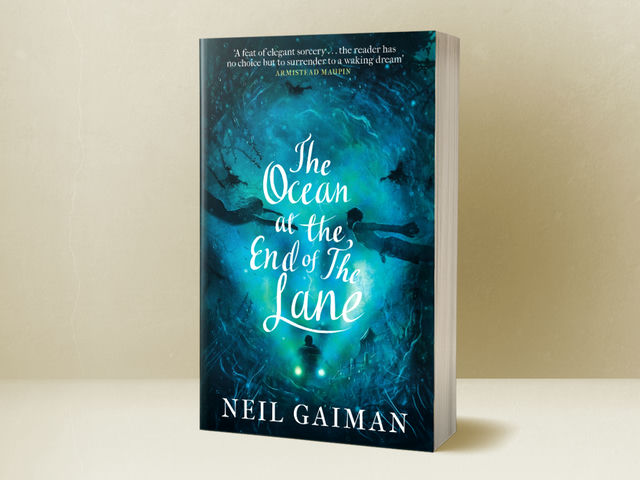The Ocean at the End of the Lane
Neil Gaiman, 2013

I’m not sure that any review can do justice to the dark beauty of this story. I love this modern fairy-tale so completely that it seems almost futile to distil my thoughts into a brief review. Yet if I can convince even one more person to experience this wonderful tale, my efforts will have been worthwhile.
The story begins with our unnamed narrator leaving a funeral wake to take a drive in the country. Seemingly aimless, buried memories direct him to the place where he grew up as a small boy in the 1960s. The family home is long gone, but the lane remains and he recalls the farm at its end. Finding himself at the farm and sitting by its duck-pond, his memories of the summer of his seventh year are woken and that story begins in earnest.
George is a lonely boy. He lives in an old house set back on a quiet lane somewhere in the Sussex countryside. He loses himself in books in lieu of adventures with friends he doesn’t have. He loves myths and legends and like most seven year old boys, he delights in exploring the natural world.
One day a tragedy befalls the South African lodger who is staying at George’s family home. Discovered dead on the back seat of the family car, the lodger’s death sets in motion a strange adventure that no adult would believe – but that every seven year old would know is truest experience they will ever have.
The lodger’s death leads George to Lettie Hempstock, an eleven year-old girl who lives with her mother and grandmother on nearby Hempstock farm. From the start we understand that this family is more than they appear: Lettie explains to George that their duck-pond is an ocean and it was brought with them when they travelled from the Old Country. Friendship with Lettie is exciting: she sees and knows things that no normal eleven year old girl should, and George accepts it without question.
But their friendship comes at a cost: The lodger’s death has awoken a mysterious creature; a creature that may fulfil any man’s wish but at a cost far greater than he could afford. Gaiman weaves the fantastic with the every-day as he builds a compelling and mesmerising world that sits outside our common human experience. George is caught at the centre of a tale of ancient terrors, uncommon magic and forces that have existed beyond the beginning of time.
To reveal too much more of Gaiman’s dark tale would be to spoil it. Evoking the voice of Alan Garner, and animating the landscape with dark terrors, Gaiman weaves a new fairy-tale that feels familiar yet is fresh, beguiling and menacing in equal measure. It took me right back to the first time I read Weirdstone and left me similarly transfixed.
The writing itself is beautiful. The voice given to young George is pitch perfect. Gaiman’s ability to recall the feelings and experiences of this lonely boy is so accurate that it’s heartbreaking. Every experience is keenly felt, and I related to so closely to George that I was transported back to my own childhood with its own traumas and tears.
This is a timeless story of childhood dreams and nightmares. It asks questions about memory and loss and whether our recollection of our formative experiences can ever be trusted as the truth. But beyond these questions, the story gives us hope: hope that we can be worthy of the friendships we make and of the life that is given to us.
I know I will re-read this tale many times. It will always make me weep because it holds the truth of childhood at its heart and respects it. It’s a story that knows we mustn’t ever forget what it’s like to be seven years old, for fear that we’ll forget how to live as an adult. While there is darkness and tragedy in Gaiman’s tale, there is ultimately hope – a hope that we be kinder, gentler adults and remember our childhood dreams so that our own children might have their own dreams too.